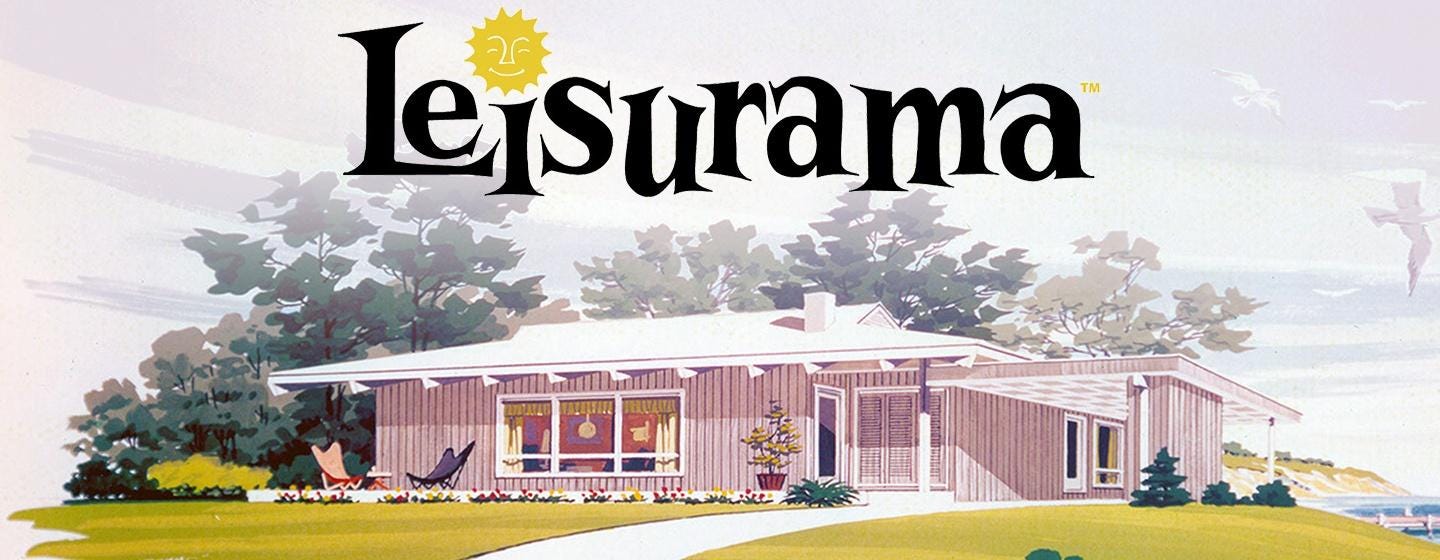I think of myself as a connoisseur of what I call the ferocious ironies of life—that is to say, irony in the literary sense, a device that creates a contrast between what is expected and what actually happens.
A prime example: You have read much about my parents’ little summer house in Montauk, in both “Rotten Romance” and “Eat My Memoir.” For the benefit of those who missed those chapters, here’s a brief recap. In the spring of my sixteenth birthday, my parents bought a tiny summer house in a community regrettably called, at first, Leisurama. The houses, on the Long Island Sound side of the village, were designed by the firm of Loewy/Snaith (co-founded by famed industrial designer Raymond Loewy) and marketed both through local realtors and, amazingly, Macy’s department store in New York. Visitors to the Herald Square store’s ninth floor could view and purchase a lot and an entire house, furnished right down to hand towels and juice glasses.
My parents, in 1967, ended up with a two-bedroom model for $16.5K, unfurnished because of something called a “chattel mortgage,” which meant the bank had seized most of the movable contents from the previous owners. So over the years the place filled up with cast-offs from their Upper West Side apartment and from yard sales, along with closets full of the detritus of childhood: ice cream makers, board games, snorkeling gear, catcher’s mitts, badminton rackets, and battered sun hats.
A two-block walk from the beach, the house was a great little getaway during my college and grad-school years, and for the first decade or so of my marriage, when we took up residence for generally carefree weekends of sunbathing, surf casting, and copious amounts of gin.
My brother and his wife never visited, though they were repeatedly invited, and so my brother and his wife never understood the value of Hamptons real estate (and indeed even scruffy little Montauk was part of the Village of East Hampton)—properties that just kept going insanely up and up for the years of my family’s residency, until now a modest seasonal three-bedroom rental in, say, Amagansett, another village in East Hampton township, could easily set you back about $100K.
When my parents died in 2001-02, they bequeathed the property to both of us. I argued we should hold on to it, put in some necessary repairs, and rent it out for a couple of months every summer. Even tiny Montauk houses could command hefty rental fees. My brother wanted no part of that—he wanted to sell, immediately, no reasons given. He began signing his emails “Sternly, Willy.” I reasoned that this was my last remaining immediate family and I wanted to keep the peace between us. We sold the house in less than a weekend for $460K. I did not have the money to buy him out but should have appealed to wealthier friends. Two years later, the houses in that community were selling for $800K, and after that I quit checking real estate ads in the Times because it was all too depressing.
Relations between my brother and me grew ever more strained for reasons beyond my comprehension, until the last seven years of his life, when he and the wife stopped communicating completely. I did not even get a chance to say good-bye after his chemotherapy for prostate cancer failed. She simply emailed with the news that he was gone.
So ferocious irony: selling the house was, for my part, one way of keeping our sibling relationship warm and cozy. And now, if we hadn’t sold the damn property, I could be warm and cozy and a bit more financially secure, even if my bro and I had parted for good 22 years ago.
Another ferocious irony: I was always indifferent about having children, even when my peers were going through “elderly primagravida” anxieties in their thirties and suffering through miscarriages, ectopic pregnancies, and IVF treatments. I never really understood the baby-making fever. Nonetheless I tossed away my diaphragm for a few years and took a laissez-faire attitude. If Nature wanted me to be pregnant, she would send a sign (or if I was really lucky, a holy dove). Nothing happened. And by the time I was 42, I was divorced and frankly grateful not to have children. I assumed it was probably my fault because there was a time when I smoked like a chimney and drank like a fish (and fell back on lots of bad clichés). My womb, I reckoned, probably looked the crawl space in somebody’s rundown fixer-upper.
Mr. Landi remarried rather quickly, our relationship devolved into a tenuous but lasting friendship, and at some point he confessed to me that the medical evidence had proved he was sterile. The second Mrs. Landi, her biological clock bonging like Big Ben at the age of 38, had coerced him into having his sperm tested. He was relieved, even more so I’m sure when he lost his fortune in the dot.com bust and the second Mrs. L filed for divorce.
And a final ferocious irony. A couple of years after I moved to Taos, my ex, who had relocated to this sleepy little mountain village a year before me, hooked up with a woman named Mary. I didn’t much like her, though I tried to find some common ground over a couple of awkward lunches. Soon he was living in a casita on her property (paying rent, of course) and complained that he felt like he was living in a goldfish bowl. She monitored all his comings and goings, and at a certain point she broke into his email and discovered some affectionate correspondence between us. I told him that level of violation would be a deal breaker for me, and she was so angered that she threw him out of his (her) house with less than two weeks’ notice. He went off to visit his brother in Montana for a month, but when he returned, they patched it up and remained a couple for another eight or nine years. And then just before the holidays last year she broke off with him for good. He claimed that she claimed that they didn’t have enough in common (after more than a decade!), or that she had another man. Or she wanted to be married. Whatever. He was devastated, and because it was the holidays he ended up on my doorstep just about every night.
In the next couple of months, I began noticing signs of dementia. He couldn’t remember where he parked his car, he had panic attacks driving home, he lost a series of bank cards, his short-term memory was shot. His doctor gave him a standard cognitive exam for people over 65, and ordered a brain scan and other diagnostics back in February. I nagged and I begged, but I could not get him to the hospital. He visited his brother in Montana for three weeks this summer (my hope was that he would want to stay there, among family), and when he returned, I gave him a self-administered “gerocognitive” exam. He didn’t do well on that one either (for instance, he could not draw the face of a clock). We went back to the doctor last week, and I will drive him to the hospital tomorrow, with an imaging order in hand.
My dilemma: I am fond of him, but I do not want to be his keeper in our old age. Two or three nights a week is plenty. But when Mary kicked him to the curb, she took all the friends and short-circuited his social life. I am afraid that he may spend whole days streaming the news and movies, and I’m frankly racked with worry about him.
There were times over the years when I had hoped we might get back together, but not like this. It’s almost impossible to have a conversation; we’ve lost the affectionate comfort of long-term couples because we haven’t been a couple in three decades. He is short tempered and impatient. The love I once had for him has morphed into resentful charity. Is this ferocious irony, or simply the slings and arrows of bad luck and faulty genetics?
I don’t know how this will all shake out, but I offer his present condition as a long-winded excuse as to why I am not continuing with “Eat My Memoir.” I was just getting to the point where we were entering the years of serious marital discord, and right now I can’t go there. You don’t kick a man, or rehash the bad years, when he’s down.
And, as you can imagine, I haven’t felt much like sharing recipes. Yet I do have ideas as to how I will re-orient this newsletter and I will offer one shortly.
Next weekend I’m off to Phoenix to review Larry Bell’s show at the art museum for the Wall Street Journal (my first air travel since contracting long Covid), but I’ll be back.






Dear Ann,
I am sorry you are having such troubles, but I love reading about your trails and tribulations. I think of you as a stand up writer. Your charity is to be commended and your compassion.
Barbara Berge
Writing is one of your superpowers along with perseverance and wit. I suspect it’s good therapy too.
But you’re no dope, you already know this.
I (we) am/are fans of your words so you keep writing and we’ll keep reading and being whatever support we can.
This one’s a whopper and I feel like it’s waiting for a lot of us in one form or another and sooner Han we’re ready for it. May the force be with you. XO